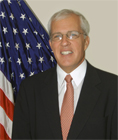by Malcolm Curtis malcolm-curtis.com
“I encourage you to engage with Cuba — it’s a delightful place.”
With those words, Michael Parmly, former senior US diplomat stationed in the Caribbean island, summed up his feelings for the country in a March 20 luncheon speech to the American International Club of Geneva.
Parmly, who is also vice-president of the AIC and a resident of the canton of Vaud, spent three years as chief of mission of the United States Interests Section in Havana, a post he held until July 2008.
A veteran of the state department who retired from the foreign service four years ago, he said that Cuba had come to occupy his thoughts a lot since.
His speech at the Swissôtel Metropole came at an auspicious moment, just weeks before an expected meeting between President Barack Obama and Cuban President Raoul Castro at the April Summit of the Americas in Panama.
The highly anticipated encounter would follow a major breakthrough in US-Cuban relations after Obama and Castro shared a telephone call on December 17th 2014 to discuss normalizing relations.
This follows more than half a century of antagonism between the two countries in the wake of the Cuban communist revolution led by Fidel Castro, Raoul’s elder brother.
So, US-Cuba what has changed?
“The short answer is in fact, very little, and at the same time the whole world,” Parmly said.
Cuba remains a single-party state, and the United States does not yet allow formal diplomatic relations “although I think that will change”.
But Parmly went on to enumerate areas where businesses could have opportunities in Cuba, although he indicated the revolution was not going to disappear overnight.
He noted that none of the thawing in relations could have happened if Fidel Castro was still in power.
“Fidel wouldn’t have allowed any of this,” he said.
While Raoul believes in the revolution”he realized that Fidel was taking the revolution down the road to disaster”.
Still Parmly, pointed out that even Fidel Castro signalled in October 2005 during one of his “stemwinder” speeches that the revolution could self-destruct and that “individuals had the ability to change their own future”.
Nine months later, he turned control of the government over to his brother.
Parmly said that Raoul may be an ideologue but he is pragmatic.
One of the first things he did upon becoming leader of the Cuban communist party was to allow people to own DVD players, computers, rice cookers and microwaves.
Then he announced he was turning over unused state land for people to farm.
Other changes allowed Cubans to use cell phones and to stay in hotels for tourists, Parmly said.
Raoul Castro, has meanwhile, said he plans to leave office on February 24th 2018, so further changes in leadership can be expected.
“If you have an idea for engaging with Cubans, go for it,” Parmly said, pointing to the high potential in Cuban agriculture.
The country also has a massive need for capital investment, he said.
But the retired diplomat acknowledged there are hurdles, including the double currency situation (the official Cuban peso and the dollar, used by tourists), and the US trade embargo.
Congress needs to change half a dozen pieces of legislation to reverse that, he said.
And compensation for past expropriation of assets in Cuba is going to be tough, with a process through the courts taking years to work out.
Parmly gave credit to Obama for promising to close the Guantanamo prison and while that hasn’t happened yet the number of inmates there has dropped significantly.
He said he expected it to be shut down — something he has personally campaigned for — before Obama leaves office.
